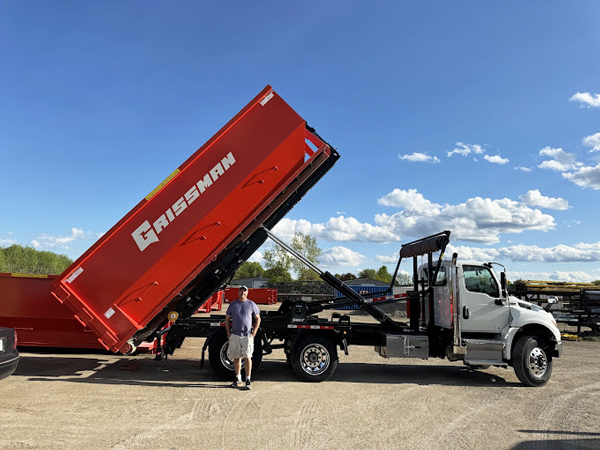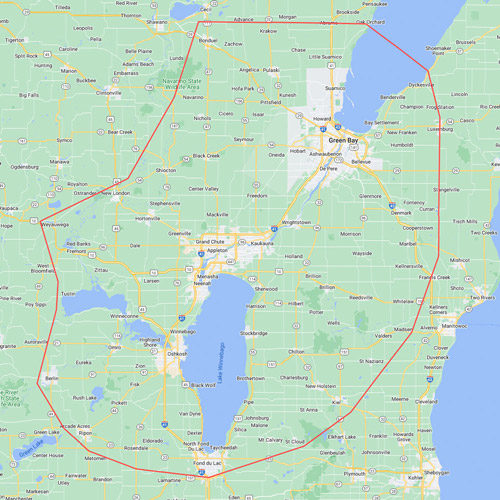
09 May Recycling 101: A Guide to Waste Management
RECYCLING 101: OVERVIEW
At Grissman, we know from personal and professional experience that recycling plays an important role in preserving our environment and conserving valuable resources.
In fact, recycling helps to reduce energy consumption, greenhouse gas emissions, and the depletion of natural resources.
In this blog article, we’ll discuss the importance of recycling, explore where and what to recycle, and finish with some useful tips to assist you with your recycling efforts.
The Importance of Recycling
Here are some leading reasons why recycling is so important:
ENVIRONMENTAL BENEFITS
Recycling significantly reduces the strain on our environment. When you recycle materials such as paper, plastic, glass, and metals, you help to minimize the need for extracting and processing raw resources. This, in turn, conserves energy, reduces water usage, and mitigates pollution associated with extraction and manufacturing processes.
If you need to recycle larger household or construction items, you should definitely consider renting a dumpster to help the environment!
RESOURCE CONSERVATION
Another reason why you should recycle is to help reduce the need for extracting resources. For example, materials like paper, glass, and aluminum can be reprocessed and used to create new products, reducing the demand for virgin materials.
By extending the lifespan of resources, recycling supports a circular economy where materials are reused, reducing the need for constant extraction and production.
Waste Reduction
Lastly, when you recycle, you help to divert waste from landfills. This reduces the pressure on limited landfill space. Landfills not only emit greenhouse gases but also pose potential risks to soil and water quality.
Recycling prevents valuable materials from ending up in landfills, promoting a sustainable waste management system.
Recycling 101: Where to Recycle
Here are some questions and answers for where to recycle:
WHAT TYPE OF CONTAINER SHOULD YOU USE?
To facilitate recycling, it’s essential to use designated containers such as dumpsters, recycling bins, or bags. These containers are typically provided by local authorities or waste management companies and should be clearly labeled for easy identification and separation of recyclable materials.
WHEN & HOW ARE MATERIALS COLLECTED?
Collection schedules and methods will vary depending on where you live/where your construction site is located. For example, many municipalities have curbside pickup programs, where recyclables are collected alongside regular trash. Others may have designated drop-off centers or recycling facilities where you can bring your recyclables.
We recommend checking with your local waste management agency to determine the collection schedules and guidelines in your area.
DO YOU NEED TO SCHEDULE A SPECIAL PICKUP FOR E-WASTE OR METALS?
In some cases, special pickups may be required for electronic waste (e-waste) or bulky items such as appliances or scrap metal. These materials often require separate handling due to their composition and potential environmental impact.
When in doubt, you should contact your local waste management agency to inquire about any special pickup services available for these items.
WHICH ITEMS SHOULD I AVOID RECYCLING?
Certain items may not be recyclable due to contamination or composition. Items contaminated with food waste or hazardous substances should be properly disposed of according to local regulations.
Similarly, some types of plastic, such as polystyrene foam, may not be accepted by recycling facilities in certain areas. More here on things that don’t belong in recycling.

Recycling 101: WHAT MATERIALS TO RECYCLE
PAPER
Recyclable paper includes newspapers, office paper, magazines, cardboard, and paper packaging. Ensure that these items are clean, dry, and free from food residue to maintain the quality of recycled paper.
PLASTIC
Many types of plastic can be recycled, including bottles, containers, and packaging materials. Look for the recycling symbol on plastic items, typically found on the bottom, and check your local guidelines to determine which types of plastics are accepted for recycling.
GLASS
Glass bottles and jars are also recyclable. When recycling glass, be sure to remove lids or caps and rinse out any residues before placing them in the recycling container.
METALS
Metal items such as aluminum cans and steel cans can be recycled. Rinse out any remaining contents and flatten cans if possible to save space. Metal recycling not only conserves resources but also reduces energy consumption during the manufacturing process.
BATTERIES
Certain batteries can be recycled, particularly rechargeable batteries like those found in laptops, cell phones, and power tools. Local recycling centers or electronic retailers often have drop-off points for battery recycling. However, note that single-use alkaline batteries can typically be safely disposed of in regular trash.
ELECTRONICS
Electronics should be recycled separately due to their complex composition and potential hazardous materials. Many communities have electronic recycling programs or designated drop-off locations for old computers, televisions, and other electronic devices. Proper disposal of e-waste helps recover valuable metals and prevents toxic substances from contaminating the environment. More on how to recycle electronics in Wisconsin here.
Recycling 101: TIPS TO FOLLOW
We’ll close our discussion by sharing some tips you need to know for recycling:
ENSURE EACH ITEM YOU RECYCLE IS CLEAN!
Make sure that you rinse out containers to remove any food residue or contaminants before recycling them. This helps to minimize contamination.
EDUCATE YOURSELF
Familiarize yourself with your local recycling guidelines and programs. Stay informed about which materials are accepted, proper sorting techniques, and any updates or changes in recycling policies.
REDUCE PLASTIC
Plastic waste is a significant environmental concern. Whenever possible, choose products with minimal packaging or opt for alternatives like reusable cloth bags or stainless steel water bottles.
RENT A DUMPSTER FOR LARGER RECYCABLE ITEMS
Have larger recyclable items on hand? You should rent a dumpster to remove these properly. A dumpster and waste management company will either give you professional tips or handle the process of properly disposing of recyclable items. More here on why you may need a dumpster.
SPREAD THE WORD!
Educate your friends, family, and community about the importance of recycling. Encourage others to participate in recycling programs and adopt sustainable practices.
Read More: 8 Tips for Loading a Dumpster
HOW GRISSMAN CAN HELP MEET YOUR DUMPSTER RENTAL NEEDS
At Grissman, we have years of professional experience providing the Fox Valley community with recycling and waste management.
We offer 20 and 30 yard dumpster rental options for any residential, commercial, industrial, or construction project to help you more easily recycle various items while performing a home renovation, cleanout, roofing, or construction job.
A professional dumpster company usually has multiple dumpster sizes available for your convenience or the size/involvement of your project. In addition, dumpster companies often work in collaboration with local recycling facilities, ensuring that recyclables are handled and processed correctly.

CONTACT US
Need a roll-off dumpster rental service for moving into a new home? Contact Grissman today!
Our team serves the Fox Valley, including Appleton, Neenah, Menasha, Kimberly, Little Chute, Kaukauna, Oshkosh, Fond du Lac, De Pere, Chilton, Sherwood, Hilbert, and Green Bay. Hiring our dumpster company is helpful for streamlining the recycling process, promoting better waste management and environmental sustainability!
